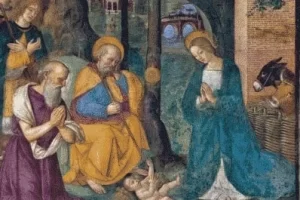Let’s look at some criteria for Christian vocational discernment. A few days ago, I was walking through Rome, I was dressed as a priest, and I was stopped by two young men, who were both covered with tattoos and piercings. They wanted to have their picture taken.
Table of contents: criteria for vocational discernment
2. Motivation, intentions and aptitudes as criteria for vocational discernment
- Temperament and character
- Basic affectivity and the gift of celibacy
- Identity and mission: God and others
- Outline of the criteria for vocational discernment
3. Psychology and supernatural mystery in the criteria for vocational discernment
- Evaluating freedom and health in vocational discernment
- A balanced personality
- Is there such a thing as a vocational test and can we commit for life?
- Criteria for vocational discernment regarding sexuality
- Openness to the possibility of a definitive decisions
- Openness to transcendence
Noting my surprise one of them said to me, “Father, don’t just look at the outside”. So I asked him: among so many tattoos, do you have any Christian tattoo, a cross, or something… His face lit up and he told me: yes, I have God… On his forearm, in a small space surrounded by many other indecipherable drawings was the word God.
I remembered what the Pope wrote in his apostolic exhortation “Christus vivit”, addressed especially to young people: God has tattooed a great dream on the heart of every person and he is waiting for it to come true.
This dream, this ideal, is sometimes not evident. Therefore, in discernment, one must not look only at what is on the outside, one must go to the depths, to the heart, where one decides whether or not to choose God, as the Catechism of the Church says.
Pope’s Catechesis on discernment
On August 31, 2022, the Pope began a series of catechesis on the theme of discernment. In the first one, he told us that it is difficult, because it involves compromising our freedom and knowing our heart; but, as we see in the Gospel, it fills us with joy.
We have the example of the one who finds the treasure or the pearl and full of joy does what is necessary to obtain them. We also know the Magi, who follow a star that leads them to the newborn Jesus. And the holy women, who after days of great pain, discover that Christ is risen and then run to make him known.
What it means to discern
All of us are called by God to something, we have a dream tattooed on our hearts, a star that can guide us. To discern is to differentiate between different possibilities, especially between good and the bad. The term vocation comes from the Latin vocare, which means to call: to feel a calling to a certain task or mission. To discern a vocation we need criteria, a word derived from the Greek verb krino, which means to judge and choose.
We will focus on personal discernment: how to judge and choose our mission, what is our dream, our light and strength. This discernment is linked to ecclesial discernment: the help given to us by those who have the mission of verifying our suitability for the path we wish to undertake.
In the Gospel our Lord calls many people to follow him. Some say yes immediately and abandon everything. Others, like the rich young man, decide not to take this step, the invitation from the Master, and go away sadly. Heinrich Hofmann captures the scene: a young man realizes that the Lord is calling him, he sees one of the disciples on the right hand side of the master, holding a sick man. And the young man decides not to step forward to serve. This brings us to the first topic.
1. Types of vocation
Not everyone is fortunate enough to hear Jesus personally calling, or experience extraordinary phenomena that convince them. Each vocation is unique because each person is unique. There are as many types of vocation as there are people in the world.
The call of God is perceived in many different ways; and the way of responding or giving oneself is also very variable.
Among so much variety, perhaps we ask ourselves: is it possible to be sure that it is God who is calling? Am I making it all up? Only with faith can we understand what we ask in the Lord’s Prayer: “Thy will be done on earth as it is in heaven”; or cry out to Jesus like blind Bartimaeus, as he shouted: “Lord, let me see” (cf. Mk 10:46-52).
To follow a Christian vocation is to follow a person, Christ, who said “I am the way, the truth and the life” (Jn 14:6). Therefore, it is vital to get to know and love him more and more: not just to admire him like an ancient monument.
Ways of presenting the call
Following St. Ignatius of Loyola, we can speak of three forms or moments of presentation of the vocation that lead to an appropriate decision.
Sudden illumination: perceiving a light or voice, or something that in some way moves you. Like the conversion of St. Paul. We will have to determine whether it is a supernatural phenomenon of a mystical nature or if it is the fruit of a healthy or unhealthy imagination. There may be psychological problems or an exaggerated emotionalism that leads to mistaken perceptions. If this were the only basis of the call, it would have to be distrusted.
Sensitive attraction: finding delight in the things of God, and in the path he wishes to follow. A vocation that was based only a sensitive attraction, the pleasant feelings that the choice entails, is more likely to be unstable.
Thoughtful reasoning: it is that of one who does not remain on the superficial level and uses his intelligence to analyze the data with his intelligence, realizes that he has been created to praise God, who in turn calls workers in to his harvest and, with this conviction and the desire to serve, chooses one of the vocations authorized by the Church.
The person who considers his vocation rationally understands that he faces no real obstacles, that God somehow “needs him” and so says yes. One’s own strength takes second place, one trusts in the one who calls, who cannot be mistaken, and one takes the risk of faith. It is not that one rejects or goes against one’s feelings. On the contrary, a free decision moves the affectivity and fills the soul with joy and peace. These are the most thoughtful and mature vocations and the most stable.
Vocational discernment beyond feelings
The Church has often reminded us of this. Pius XI wrote: Vocation is not “a sentiment of the heart, or an emotional attraction, which in any case may may be lacking at times, or not felt, [but] vocation is revealed in the uprightness of intention of the aspirant to the priesthood, united to that set of physical, intellectual and moral gifts which make him suitable for that state” (Encyclical Ad catholici sacerdotii, 20-12-1935).
A vocation is not just a feeling or an illumination, but a personal encounter with Christ. In this sense, Cardinal Newman said: if the Lord had appeared to many who did not follow him, they would have been impressed and nothing more… but his disciples set out to evangelize! What could have been an unusual memory became a personal encounter.
There will always be three types of calling: firstly, an illumination, perhaps in the form of inspirations of the Holy Spirit, a light, or inner conviction, a feeling of joy and perhaps a certain fear. Secondly an attraction to the person of Christ and a certain a path. And finally, the reasoned decision.
God’s call fills life with meaning
Vocation fills one’s life and is discovered with mind and the heart. The film Babette’s Feast, based on a story by Isak Dinesen, is useful here. In 1871, Babette, a Catholic cook has to leave Paris and goes to serve two Lutheran ladies in a seaside village in Denmark. Then she wins a lot of prize money, and spends it on a dinner to cheer up those she serves.
After dinner an interesting dialogue takes place. One of the ladies, upon learning that she has spent all the money on the dinner, says to her: so now you are going to be poor for the rest of your life. To which Babette replies: An artist is never poor. This is what self giving to God is like. A person who follows their vocation is happy even in this world, as long as they do not stop looking at heaven. They discover that, despite their poverty, their limitations, they can enrich many: and make them happy, like a good artist.
The Pope refers to this film, in the Exhortation Amoris Laetitia “Ah, how you will delight the angels!” It is a joy and a great consolation to bring delight to others, to see them enjoying themselves” (n. 129). This bring us to the second theme.
2. Motivation, intentions and aptitudes as criteria for vocational discernment.
In his catechesis the Pope said that discernment requires us to know ourselves. This means a self-reflection made using our mind and heart. We should not look only at the outside.
Temperament and character
The first thing we can know is our temperament, our inherited way of being, for which a test can be useful, such as the one on this website. It is good to accept our temperament with its strengths and weaknesses as a gift from God. Each one has to see which are the virtues we are most in need of to forge a good character.
We also have to discover possible wounds of the past, and our most ingrained defects. For example, perfectionism, rigidity or an excessive sense of duty, can be a reflection of past wounds. There may be a harmful thought that springs from that past wounds: since no one values me, I have to be perfect. This personality test may be useful for you: Temperament test.
Basic affectivity and the gift of celibacy
Next, we have to know our affectivity: that is to say, to understand our emotions, in order not to live like a stranger inside our own home. Why are we sad or happy, what makes us fear or despair?
These emotions are fed by convictions. It is necessary to get to our underlying ideas and convictions and not just focus in appearances. A strong conviction can be very helpful. In a Christian it should be: I am the son of a God who loves me. But sometimes it appears distorted, for example to see God only as a punisher, to be moved by fear; to think: I am worthless, I am useless, no one cares about me….
To know oneself means discovering one’s own motivations and intentions. Some can be more or less unconscious, and one must come to see them in the light of God. This requires an examination of conscience, which will lead to several questions. Such as, why do I want this path, what am I looking for, why do I want to become a priest, or enter religious life, lead a life of apostolic celibacy.
If one is considering a vocation to celibacy, it is important to understand and appreciate the married state. It is necessary to understand human love, which involves sacrifice, in order to understand divine love, which also involves sacrifice. Love is not just infatuation or emotion, or a stronger heartbeat.
Identity and mission: God and others
Choosing the right vocation requires knowing one’s own identity. Who I am, who I want to be and not want to be… It means developing a unique an essential capacity of the human being, which is self-transcendence, or going out beyond oneself. Georges Chevrot said, a conformist spirit leads on to think and behave like others, the vocation of the Christian obliges him to live for others.
A vocation that is centered on the person himself, and is marked by egocentrism, can easily crumble. Whereas love is capable of enduring the greatest difficulties and the toughest crises.
Vocation can be seen as the growth of a seed from the soil from which we are made.
Outline of the criteria for vocational discernment
The roots are grounded in a healthy personality or way of being: the temperament, inherited frown parents; and the character forged by negative and positive experiences.
The substratum where a vocation to germinates should be marked by maturity with self-knowledge, autonomy and self-esteem. A clean heart is required with an open disposition, a capacity to love, to forgive, and to take decisions; and the right motives.
Individual and interpersonal skills are also needed. That is, the way in which one uses one’s abilities and handles one’s strengths and weaknesses. The way in which one behaves in front of others and deals with them. At the same time aware that the vocation is irrigated by grace with God as the sun that attracts. Thus, the heart beats in unison with the will of God and is moved to action.
The way to be authentic is by following one’s vocation. We see it in the life of a young man, Carlo Acutis, of the diocese of Milan, who died at the age of 15. He was beatified in 2021. He had a great love for Jesus in the Eucharist, and he loved computers and the web. This is the phrase: “All are born as originals, but many die as photocopies”.
3. Psychology and supernatural mystery in the criteria for vocational discernment
This third section unites two dimensions of vocation: the psychological, our mental processes: our affections, behaviors, deep convictions, relationships and how we open ourselves to the supernatural mystery.
Evaluating freedom and health in vocational discernment
A Christian vocation leads to identification with Jesus, with his life of totally free self-giving. Freedom is so important that even for His Incarnation God counted in the freedom of choice of the Virgin Mary.
For this reason, when discerning, one has to evaluate one’s freedom, one’s ability to choose and also one’s degree of self-possession, self-mastery and self-control. Love is the freest of acts, so we have to ask ourselves “Am I giving myself out of love?”
The University of Navarre theologian Jutta Burgraff, wrote: “freedom is measured by what we aspire to. The greater our aspiration, the greater the freedom”. This echoes St. Thomas Aquinas, who said: “the stronger our love, the freer we are”.
Freedom requires consistency in the choices we make and the steps we take. Choosing one way means to say “No” to other possibilities. Which becomes a “Yes” of fidelity to a greater love. Our Lord’s words become a reality: “Where your treasure is, there your heart will be” (Mt 6:21). Therefore, someone who is celibate but at the same time has a boyfriend or girlfriend, would not persevere.
Mental health is important, because psychological illness reduces freedom. When there are doubts about psychological health, it may be good to consult a specialist. Psychologists who have the task of advising in the process of discernment need to have a Christian concept of the person, charged with assisting in discernment should possess a Christian conception of the person, sufficient theological knowledge and experience of the spiritual life. A mere technical preparation is non-sufficient.
A balanced personality
The 2008 document of the Congregation for Catholic Education is entitled: “Guidelines for the use of psychology in the admission and formation of candidates for the priesthood” highlights the following characteristics: a balanced personality, ability to shoulder the weight of pastoral responsibilities, a deep knowledge of the soul, a sense of justice and loyalty. And it points out: “For a correct evaluation of the candidate’s personality, the psychologist can use interviews and tests, which must always be carried out with the prior, explicit, informed and free consent of the candidate”.
It goes on to say that the various obstacles have to be quickly identified: “excessive emotional dependence, disproportionate aggressiveness, insufficient ability to be faithful to responsibilities assumed, or inability to establish serene relationships of openness, trust and fraternal collaboration with others and with their own authority, confused or not well-defined sexual identity.”
Says that the period of formation will have to be interrupted if the candidate, in spite of his efforts, and the support of the psychologist or psychotherapy, continues to show inabilities to face realistically in areas of grave immorality”.
Specific reasons mentioned are: “serious problems of immaturity, such as strong affective dependencies, notable lack of freedom in relationships, excessive rigidity of character, lack of loyalty, uncertain sexual identity, strongly rooted homosexual tendencies, etc.”.
Is there such a thing as a vocational test and can we commit for life?
Many tests for assessing personal characteristics are available. There are many others designed to help get to know myself better (the Personality Test in this website). Psychological tests can help in the task of discernment, but they are not indispensable or one hundred percent accurate.
A test or even a psychologist can never be made responsible for discernment. We can say with certainty that only after a long period of discernment lasting many years, can one safely allow a person to enter a vocation path in a definitive way. There are no vocation meters.
In the process of discernment, it is important not to accentuated or very numerous defects. Certain peculiarities are sometimes indications of a complicated character. They may be accompanied by somatic problems such as headache, heartburn, seizures, pain without apparent cause. Each person should be evaluated case by case.
If someone has an important personality defect, or mental disorder, this should be resolved setting out on a definitive path.
Criteria for vocational discernment regarding sexuality.
Confirmed sexual deviance, or frequent unchaste acts indicate a lack of suitability for a vocation. They can also indicate psychological imbalance and inability to take on commitments freely.
From the psychological point of view, a person who desires to live celibacy out of love for God can suffer more serious disadvantages if he or she is not mature or does not habitually safeguard for the virtue of chastity. Even so, marriage is not a remedy for unchastity, it is also a vocation. And difficulties in sexuality may not simply disappear with marriage.
Openness to the possibility of a definitive decisions
In order to persevere on the chosen path, it is essential to be convinced that definitive decisions are possible. The greatest love implies permanence: what would we think if someone told us I love you very much, while you are young?
Recognizing that definitive decisions can be made is essential, as Benedict XVI and Pope Francis have reminded us. If this is denied, it generates insecurity about the future and diminishes our happiness. This is why periods of testing and trial are necessary.
Openness to transcendence
This openness, or going out of oneself, takes us away from self-centeredness and allows us to give ourselves. It arises from a longing for truth, beauty and goodness, which leads us to the discovery of God’s love.
To open oneself to transcendence in the context of vocation is to realize that we are not doing God a favor, but that it is he who is illuminating our life and filling it with meaning.
Christian vocation in St. Josemaría
We are not called to identify ourselves with an idea but with a person, whom we have to get to know, without focusing on superficialities or appearances. St. Josemaría summarized the itinerary of the Christian vocation quite simply: May you seek Christ, may you find Christ, may you love Christ (cf. The Way, 382).
This process begins by thinking about who Jesus is for me and who I am for him. That helps us see life as mission. There is what the psychiatrist Viktor Frankl called a Copernican turn in psychology: “don’t focus so much on what you want from life, but on what life expects from you”.
Vocation as openness
Openness to transcendence is openness to love and service. To transcend means to want to serve as instruments. Mother Teresa of Calcutta said she was: “A piece of pencil with which (God) writes what he wants”.
Openness to transcendence gives full meaning to life. One discovers a mission, founded on the knowledge that one is a child of God, who wants to spread the joy of following Christ to others.
Servant of God Montse Grases (1941-1959) was a 17-year-old girl from Barcelona, now in the process of canonization, who had decided to follow the Lord in celibacy. Her joy and vitality were striking. She was very much fond of a Peruvian song that sums up the desire of a person in love: “I remember the first time I met you: I offer you three things: my soul to win you, my heart to love you, and my life to spend with you.
Viktor Frankl, Mother Teresa and Princess Diana all passed away in 1997. I remember an article written by a journalist which remarked how Frankl had constantly spoken and taught about the meaning of life; Princess Diana had searched for it intensely; and Mother Teresa had found it. In that article the journalist (Léonie Caldecott) revealed that she asked that she asked to be baptized in the Catholic Church, after meeting Mother Teresa.
Conclusion
As the priest, psychiatrist and theologian Joan Baptista Torelló wrote in “Psychology and the Spiritual Life” (Spanish: Psicología y vida Cristiana), vocation is an “encounter of freedom and grace, of calling and choice, of human and divine will”, where love is the key, this is the essence of every vocation.
I conclude with three ideas that summarize the criteria for vocational discernment
We are called to total love of God: “With all your heart, with all your soul, with all your strength, and with all your mind” (Lk 10:27). Without focusing only at what is on externals.
Every Christian who wants to follow God’s will, has to ask themselves if they practice the Beatitudes, which Pope Francis called the Identity Card of the Christian.
Pass the torch from hand to hand (otherwise the vocation would be meaningless): asking the Lord of the harvest to send workers into his harvest: He is still calling and there are many people willing to follow him. Maybe one of them is you.
Wenceslao Vial










0 Comments